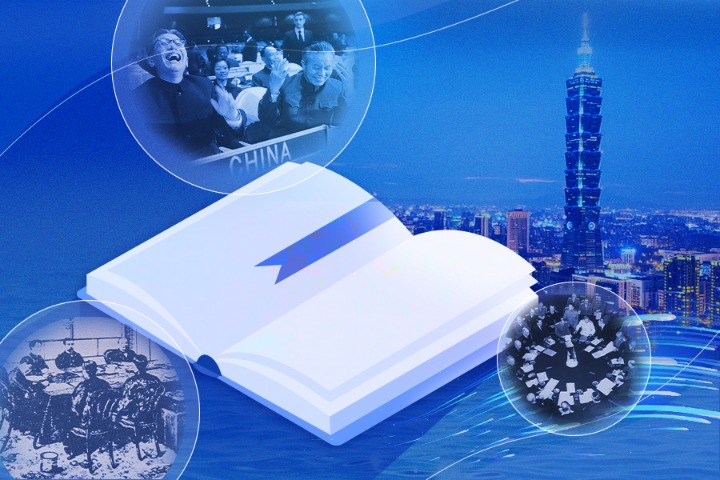Taiwan researcher devoted life to motherland


One reason I love Beijing is because there is no better place in China where one can participate in the country's development and witness history unfolding.
Every March, the National People's Congress and the National Committee of the Chinese People's Political Consultative Conference convene in Beijing for meetings known as the two sessions. With the warm spring sunshine, it seems as though the streets of Beijing become more solemn and vibrant during the sessions.
Passing by the Great Hall of the People, every motorist or pedestrian knows that thousands of NPC deputies and members of the CPPCC National Committee are inside discussing national affairs.
This year, as a journalist, I participated in the coverage of the second session of the 14th CPPCC National Committee. Over 2,000 members from advisory bodies such as the China Association for Promoting Democracy, the All-China Federation of Returned Overseas Chinese and the Taiwan Democratic Self-Government League arrived with their own proposals or those of their teams, offering suggestions for the development of various sectors in the country.
One expert in the field of technology from Taiwan left the deepest impression on me, not only because his work and proposals happened to involve the fields of technology and ecology that I am concerned about, but also because, as the Liaoning Provincial Committee Chair of the TDSL and a member of the 14th CPPCC National Committee, he recounted to me stories of his friends from Taiwan who, over the past few decades, have studied, settled and established themselves on the Chinese mainland.
"As my friends say, the motherland is a place where all your dreams can come true. I was born in a Year of the Dragon, and as compatriots from Taiwan, our attachment to the dragon is deep. The youth on both sides of the Taiwan Strait are descendants of the dragon," said Cai Rui, director of the Department of Science and Technology of Liaoning province.
Cai told me that Liaoning ranks among the top in the country in terms of the scale of its defense technology industries represented by the production of aviation equipment, ships and more. It's also a national leader in the large-scale production of metallurgical, mining, petroleum, chemical and power equipment.
Over the past few decades, many Taiwan researchers have quietly made outstanding contributions here, he said.
Cai recalled an encounter 10 years ago on a bus with Lin Tiezheng, who was nearly 90 years old at the time. Lin had been passionate about science since childhood, but in an era when Taiwan was occupied by Japan, personal prospects were strictly limited. He overcame various difficulties, studied abroad and pursued further studies in science and engineering.
In 1955, then-premier Zhou Enlai called on overseas Chinese students to return to participate in the construction of a new China. Lin and his family responded to the call and returned to the motherland, joining a research institute of the Chinese Academy of Sciences.
Lin immediately devoted all his energy to research. He was initially appointed as the first leader of the organic element analysis group, conducting research on oil shale, and he also established a group focused on the synthesis of organic standard materials.
In September 1981, Lin went to Japan to attend an academic conference. During his stay there, his younger brother came to visit him. When they met at Osaka's airport, it had been nearly 40 years since they had seen each other. They embraced each other tightly, speechless and with tears in their eyes, Cai said.
Since 1980, Lin has served as a deputy to the People's Congress of Xigang district in Dalian, Liaoning, as well as a member of the Standing Committee of the Liaoning Provincial Committee of the CPPCC. In 1982, he and his team placed second at the CAS Technological Achievement competition for their work on the QG Automatic Hydride Mercury Generator. Three years later, they won third prize at the National Scientific Research competition for their generator work.
Lin's work stands as a model for generations of talent from both sides of the Taiwan Strait dedicating themselves to the development of the motherland.
Cai shared Lin's words with me, and I want to share them here with readers, hoping it encourages people from our generation: "I grew up in a turbulent era of colonization and war, aspiring to engage in scientific research throughout my life. In the ever-changing era, I encouraged myself to be like a small boat that never capsizes in the rushing stream, unwaveringly dedicated and ordinary."
- Top News
- Events honor role of first provincial governor in modernizing Taiwan
- 'Soul Ferryman' of Taiwan Strait: Liu De-wen's 22-year mission to bring veterans home
- Taiwan-born kendo instructor grows cross-Strait ties
- Chinese mainland says cross-Strait consultation possible with recognition of '1992 Consensus'




